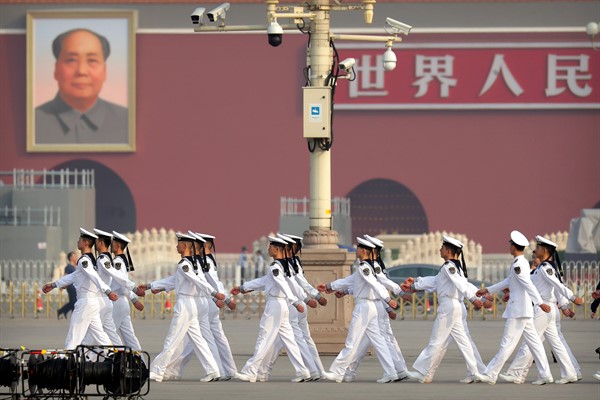In 1998, during a year at the University of Hawaii on a language fellowship as I prepared for a career shift from West Africa to East Asia, I sat in a darkened room one afternoon to take in a briefing about big, looming changes in the western Pacific. The scholar who made the presentation used a projector to dramatic effect as he argued that in the decades ahead, it was almost certain that China—then very far from a peer competitor with the United States, whether in military or economic terms—would eventually make it impossible for American aircraft carriers to operate with impunity in the region.
To make his point, the radius of the white circles in his slides, representing Chinese missile strikes, gradually shrunk around the virtual aircraft carriers. At first, they were almost laughably imprecise, making a hit about as likely as a shot in the dark. Every few years, though, he predicted, those circles would narrow. For a while, he said, the American flagships could ward off some of the danger by sailing in deliberate zigzags or other evasive patterns. But with missiles far cheaper than carriers, eventually it was inevitable that these 20th-century symbols of American supremacy par excellence would start sinking. In recent years, with China’s deployment of DF-26 ballistic missiles, known as “carrier killers,” and the emergence of more exotic, “hypersonic” weapons, this future is arriving right on schedule.
In its time, that briefing, and others like it, echoed like a voice in the wilderness telling the United States that the moment to begin reinventing its relations in Asia in anticipation of China’s coming rise was upon us. Few heeded it. Many in Washington were still exulting in the adrenaline rush of the first Gulf War, where recent advances in American weaponry had made the contest against Iraqi tanks and aircraft resemble a turkey shoot. The year after I heard this lecture in Hawaii, in fact, the French foreign minister famously called the United States a “hyperpower.” And though the country would be deeply shocked just a couple of years later on 9/11, more years of sermonizing by American diplomats about the United States being the “indispensable nation,” in Madeleine Albright’s phrase, still lay ahead.

